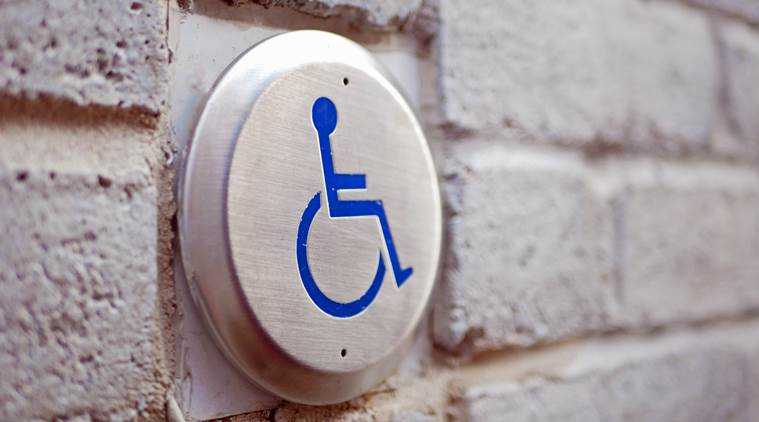 The notification stated that the risk of jail is a hurdle in attracting investments — from both domestic and foreign investors — which has become more pertinent after the Covid-19 pandemic in order to revive the economy. (Representational)
The notification stated that the risk of jail is a hurdle in attracting investments — from both domestic and foreign investors — which has become more pertinent after the Covid-19 pandemic in order to revive the economy. (Representational)
The Union Ministry of Social Justice and Empowerment’s notification proposing amendment of the Right of Persons with Disabilities (RPwD) Act, 2016, to de-criminalise “minor offences for improving business sentiment and unclogging court processes’’ has met with protests from the community of disabled persons, activists and organisations.
While representatives of the disabled community contend that the strong 2016 Act has, for the first time, given their marginalised community robust protection under punitive measures included in the law, ministry officials point out that the Act is being examined to make laws commensurate with the offence, which may not be the case under the 2016 law.
In its notification issued on Wednesday, the Department of Empowerment of Persons with Disabilities, under the ministry, stated that decriminalisation of minor offences will alleviate the risk of imprisonment for actions which do not necessarily have “mala fide intent’’. It stated that the risk of jail is a hurdle in attracting investments — from both domestic and foreign investors — which has become more pertinent after the Covid-19 pandemic in order to revive the economy.
Three days since the department’s notification, 125 signatories and disability activists/groups from across the country on Saturday wrote to the ministry in protest.
Explaining the reason for starting the “process of amendment”, the department’s director, and author of the notification, K V S Rao, said: “The government has undertaken the process of reviewing existing laws, many of which were devised by the British under the Indian Penal Code and had never been reviewed — such as IPC Section 377, which criminalises homosexuality. When this (RPwD) Act was formulated, many IPC Sections were added mechanically, without consideration of reformulating to keep abreast with the times.
“The notification is a call for feedback and observations from the community. The intent is not to harm the community or to pass an amendment which may be detrimental to the rights of disabled persons.”
Rao said the department will consider reducing the punishment or penalty meted out to an offence which may be classified as severe currently but which the department holds as a minor offence.
“For instance, there is a difference in severity between sexual offence against a person with disability and insulting a disabled person by calling them names, or (calling) a non-disabled person by a disabled name which demeans the community,” Rao said. “At present, both offences are considered severe, and both have a financial penalty as well as the possibility of imprisonment. We feel both offences are not at the same level of severity and need to be treated differently.”
But disability activists demur. They argue that the 2016 Act was the result of years of struggle, and came into force after India became a signatory to and ratified the UN Convention on Rights of Persons with Disabilities in 2007.
Muralidharan, general secretary of the National Platform for Rights of the Disabled (NPRD), said: “The (earlier) 1995 Act was not as comprehensive as the 2016 Act. It covered seven types of disabilities, as opposed to 21 that the 2016 Act covers…. The 2016 Act is more about rights of disabled persons, besides an extensive list of benefits in this Act.”
He said an “integral part” of those rights is penal provisions, provided for the first time. “The penal provisions are to act as deterrents against offences against disabled persons. The department needs to understand that there are layers of discrimination that a disabled person goes through, including insults thrown at them implying that they are not good enough, This has severe psychological effects…”
Some of the rights that the 2016 Act, which came into effect in 2017, ensures is that of the right to education, right to employment and the right to livelihood, with 4 per cent reservation in government offices and 5 per cent reservation in educational institutions.
Three sections of the Act are under review: Section 89, which, in a first, imposes a fine — of Rs 10,000, going up to Rs 50,000 to Rs 5,00,000 in a second offence for breaking of any rule in the Act; Section 92(a) for intentionally insulting or intimidating a person with disability with intent to humiliate in public view; and Section 93, which pertains to companies contravening the Act or not submitting relevant documents to the Disability Commissioner when asked for.
Only Section 92(a) has a provision for imprisonment.
According to the new proposal, imprisonment provision will be taken out and the penalty can be negotiated by the sparring parties under supervision.
Delhi-based activist Satendra Singh said: “Penal provisions of this Act are meant to be as effective as those made for SC/ST persons. As the SC/ST Act is strict, it acts as a huge deterrent for offences being committed. RPwD Act was meant to do the same for us. By removing penal provision, the government is not only diluting the Act but also going against commitments it made internationally and to the UN….”
Rao said the department is “flexible” and will consider extending the date of feedback from July 10.